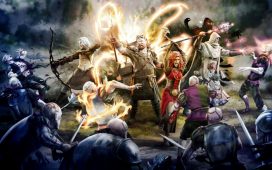Anisa Sanusi is a UI/UX designer based in Shoreditch, London. She also runs Limit Break, a mentorship program aimed at entry and mid-level developers of underrepresented genders in the games industry. Applications are currently still open. In this piece, she looks into the reasons why representation does matter and why “wishing for a bridge to appear isn’t enough”
At my first games job, there were only 4 women in a company of about 30 people. In my second job, my company was 300 strong, yet I can still list each woman by memory. At my current job, women make up 18 per cent of the company. This coincidentally closely reflects the larger UK games industry where 19 per cent of the industry workforce are women, compared to the UK average of 45 per cent (Creative Skillset, 2016). While I’m content with my workplace, there is still a lack of women representing senior or leadership roles.
Why is this important? I’m sure you’ve heard the phrase ‘representation matters’. Just like how superhero movies inspire children to do good, women role models inspire fresh faces to achieve dream careers. Sure, within our industry we have women with celebrity levels of fame such as Brenda Romero and Amy Henning, but what about closer to home? What about someone you can feasibly reach out to?
Outside of technical skills and abilities you’d usually have in your CV, a huge part of climbing the career ladder rests on personal development. There are other skills that we learn while on the job, and if we’re lucky, through a mentor. Skills like communication, negotiation, leadership and networking.
“Wishing for a bridge to appear isn’t enough. I’m building that damn bridge and I want people to use it.”
In a male-dominated industry like video games, marginalised genders tend to have limited support. If you are amongst this demographic, the pool of people similar to you is so small to begin with, much less those with experience. I, for one, have gone through some rough days at work, unsure if I was in the wrong, or if management took it too far. I’ve felt alone, not good enough, like I was not doing enough. I needed someone to give me advice, or guidance. With the advent of social media, it’s easy to scout people you admire but never in your right mind would you commit a social faux pas like sliding into their DMs.
There is a hunger from entry and mid-level developers for this network of support. Fogged by impostor syndrome, I sat back and hoped for someone to start something like it. I wished so badly for a bridge between me and a person who could empathise, a person who could help. It took a lot of encouragement from my peers but eventually I went for it. Wishing for a bridge to appear isn’t enough. I’m building that damn bridge and I want people to use it. I named it Limit Break, a mentorship program for underrepresented genders in the games industry.
What I’m championing isn’t just diversity, but inclusivity. Mentorship shouldn’t be reserved just for those breaking into the industry. In fact I’d argue those already in the workforce would make the most out of it. Imagine an industry where retention of the gender diverse wasn’t an issue – imagine the kinds of games, stories and experiences we collectively could produce. The world of video games would be a richer one, with games reflecting the layers of all the different audiences we serve. Most of all, it would be an industry safer for those who make it unique and wonderful.
You have until May 10th to sign up as a mentor or mentee on Limit Break’s website.















